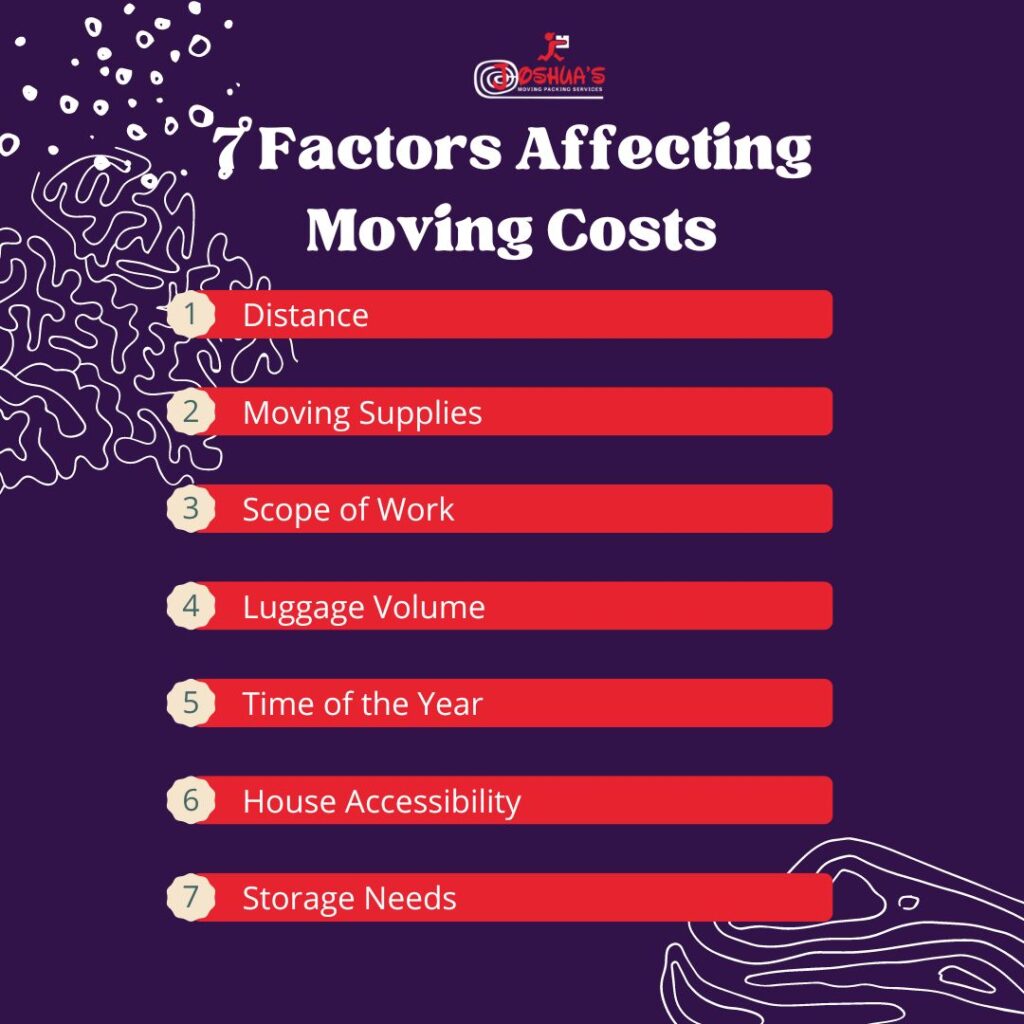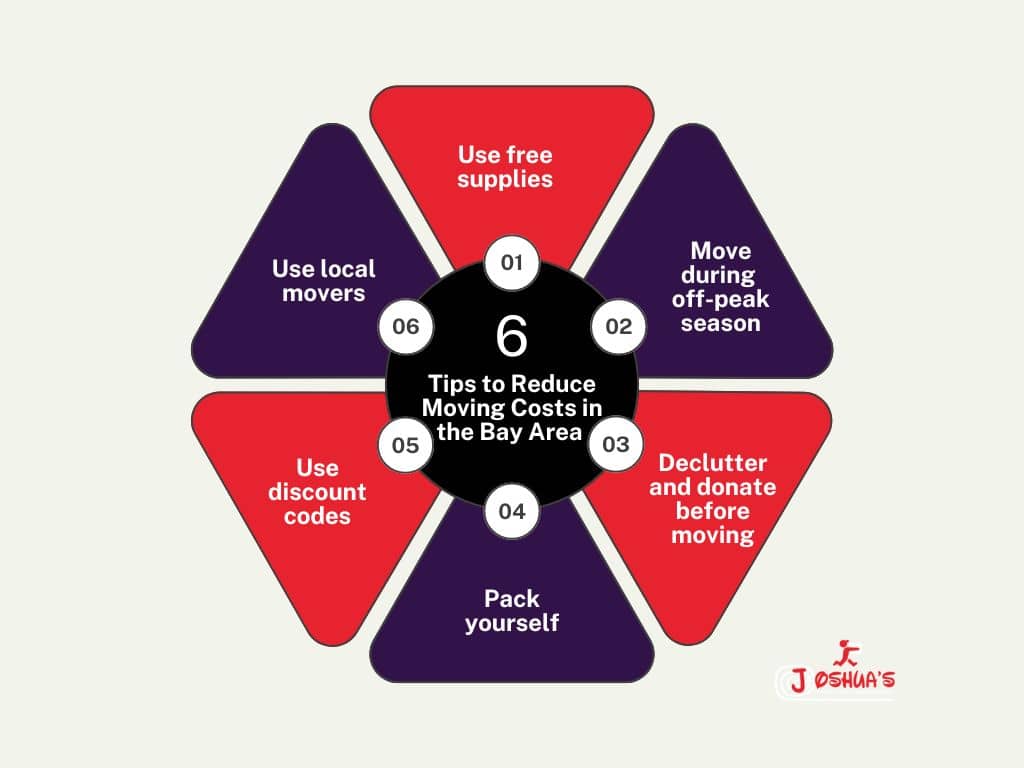On average, Americans move close to 12 times in their lifetime. Whether the move is due to a new job, a change in family dynamics, or an upgrade from the previous home, the cost of…

How Much Does It Cost to Move a Two-bedroom Apartment in the Bay Area?
June 20, 2024
On average, Americans move close to 12 times in their lifetime. Whether the move is due to a new job, a change in family dynamics, or an upgrade from the previous home, the cost of relocation remains constant. If you are wondering how much it should cost to move a two-bedroom apartment in the Bay Area, you are in the right place.
After putting our heart and soul into relocating over 3,000 families, you can count on our knowledge to help calculate your moving costs. We also explore factors that affect the cost of relocation and how you can reduce the expenses.
Go to:
- Average Cost to Move a Two-Bedroom Apartment in the Bay Area
- Factors Affecting Moving Costs
- Tips to Reduce Moving Costs in the Bay Area
Average Cost to Move a Two-Bedroom Apartment in the Bay Area
The average cost of moving a two-bedroom apartment in the Bay Area is $1,350 for local relocation. Interstate moving costs can range between $2,000 and $5,000, distance being the primary determinant.
You need 2 to 4 movers to assist in packing, loading, unloading, and setting up your new home. This process can take 5 to 10 hours, depending on the scope of engagement and distance. At a rate of $50/hour for one mover, you will pay between $750 and $1,500 for labor.
Joshua’s Moving gives you a personalized free quote to help you plan your next relocation. Whether you are moving across the street, to a neighboring town, or another state, we’ve got your back.
Factors Affecting Moving Costs
As seen above, the cost of moving a two-bedroom apartment can vary significantly. So, what makes one person pay $500, and another pays 10 times more?

1. Distance
From our experience, over 80% of Americans move within a 50-mile radius, which means most relocations are intrastate. The Bay Area is one of the most common recipients of these moves, attracting residents from other states, nearby cities, and towns.
Moving companies charge a constant amount of around $30 plus a variable of about $1 per mile. So, if you are moving to the Bay Area from the following towns or vice versa, here are the amounts you are likely to pay above the labor charges.
| San Francisco To/From | Number of Miles | Distance Cost |
| Alameda | 10 | $40 |
| Contra Costa | 22 | $52 |
| Marin | 8 | $38 |
| Napa | 36 | $66 |
| San Mateo | 17 | $47 |
| Santa Clara | 39 | $69 |
| Solano | 38 | $68 |
| Sonoma | 35 | $65 |
As seen in the table above, the effect of distance on the local relocation cost is insignificant. However, if you are moving outside California, you will likely pay more because of the return costs. Here is a comparative table to help you plan for your 2-bedroom move.
| San Francisco To/From | Distance Cost |
| Texas | $1,500 |
| Arizona | $700 |
| Illinois | $1,700 |
| New York | $2,700 |
| Pennsylvania | $2,400 |
Distance can significantly affect the cost of moving outside a state. So, it’s important to budget accordingly and consider the distance as a major factor when planning your move to or from San Francisco.
2. Moving Supplies
While you can get free moving boxes from local stores, friends, and online communities, the hassle leads most people to get supplies from moving companies. If you are considering moving boxes, bubble wrap, packing tapes, and other supplies from movers, you should add this cost to your bill.
You can get a moving supply kit for a two-bedroom house for $100-$150. Here is a checklist of the items you should have:
- Small Bokes
- Medium Boxes
- Large Boxes
- Packing paper
- Blanket
- Shrink Wrap
- Packing Tape
- Mirror Pack Universal (large)
- Wardrobe Box Kit
- Medium dish pack heavy-duty
- Dish pack Heavy Duty
- Mattress Bag (Twin, full, queen, King)
- Small Bubble Wrap
- Bubble Wrap
Whether buying moving supplies or gathering them from various sources, ensuring you have all the necessary items will make your move more efficient and less stressful.
3. Scope of Work
Moving companies charge labor per hour, so the more work there is, the higher the cost. You can reduce the scope of work by:
- Packing on your own
- Loading yourself
- Getting help from a friend
- Setting up the house
If you do most of the work yourself, you can reduce the cost of labour by $300. Although this gives you control over what is packed and left, it can also mean more time spent in the process.
Professional movers have what it takes to ensure your valuables are safe and the process is fast and efficient. So, it is ideal to use movers for a seamless relocation.
4. Luggage Volume
Weight is an essential consideration, especially for long-distance moves. A 2-bedroom house is between 3,500 and 5,000 pounds; our calculations are based on this assumption. However, depending on the load volume, you will likely get a higher or lower quote.
Moving insurance is also calculated based on the weight of your load. You can reduce luggage volume through decluttering, especially for long-distance relocation.
5. Time of the Year
The cost of relocation is usually higher during summer due to the increased demand. Between June and August, the moving cost increases by around 20% in the Bay Area. If you are planning a budget move, you can consider late spring to early fall, although the weather is not very favorable.
Weekends and holidays can also drive moving costs upwards because of the high demand for trucks and supplies. The first and last weeks of the month are also popular for relocation, a factor that could lead to higher rates.
6. House Accessibility
Limited parking, stairs, and elevators can increase moving costs for your two-bedroom apartment in the Bay Area. The difference in rates between an accessible and difficult-to-access building is between $100 and $150.
The distance between the access door and the moving truck could also mean more time spent in packing, increasing the cost. This also includes the accessibility of your new home from the parking lot or access door.
7. Storage Needs
Storage needs before, during, or after relocation can add an extra $50-$200 for a 2-bedroom apartment move. The cost depends on:
- Type of storage required: Do you want climate-controlled or ordinary storage services?
- Frequency of access: The rates could be higher if you want 24-hour access to the facility.
- Volume of luggage: The bigger the load, the higher the storage cost.
Tips to Reduce Moving Costs in the Bay Area

How can you reduce the cost of relocation? Here are tips to help you:
- Use free supplies: You can get moving boxes and other materials from local stores and save on this cost. This strategy can save between $70 and $120.
- Move during off-peak season: Consider late spring to early fall relocation to save approximately 20% of the total cost.
- Declutter and donate before moving: If you suspect some items might not fit in the new house, dispose of or give away some items you no longer need to save the $50 to $200 in storage costs.
- Pack yourself: You can save 2 hours in labor costs by packing early and using movers to load, transport, and unload only.
- Use discount codes: Most moving companies have regular discounts that could reduce costs by $50 to $100.
- Use local movers: Choose a moving company based in the Bay Area to avoid extra charges associated with out-of-area movers.
Conclusion
To get the exact cost of a two-bedroom apartment move in the Bay Area, you need an expert to estimate it. At Joshua’s Moving, we use our extensive knowledge to give you an accurate quote for the relocation. Besides, we are an affordable mover, thanks to our partnership with reliable suppliers in your neighborhood. Why not let the best help you with relocation to or from the Bay Area?

